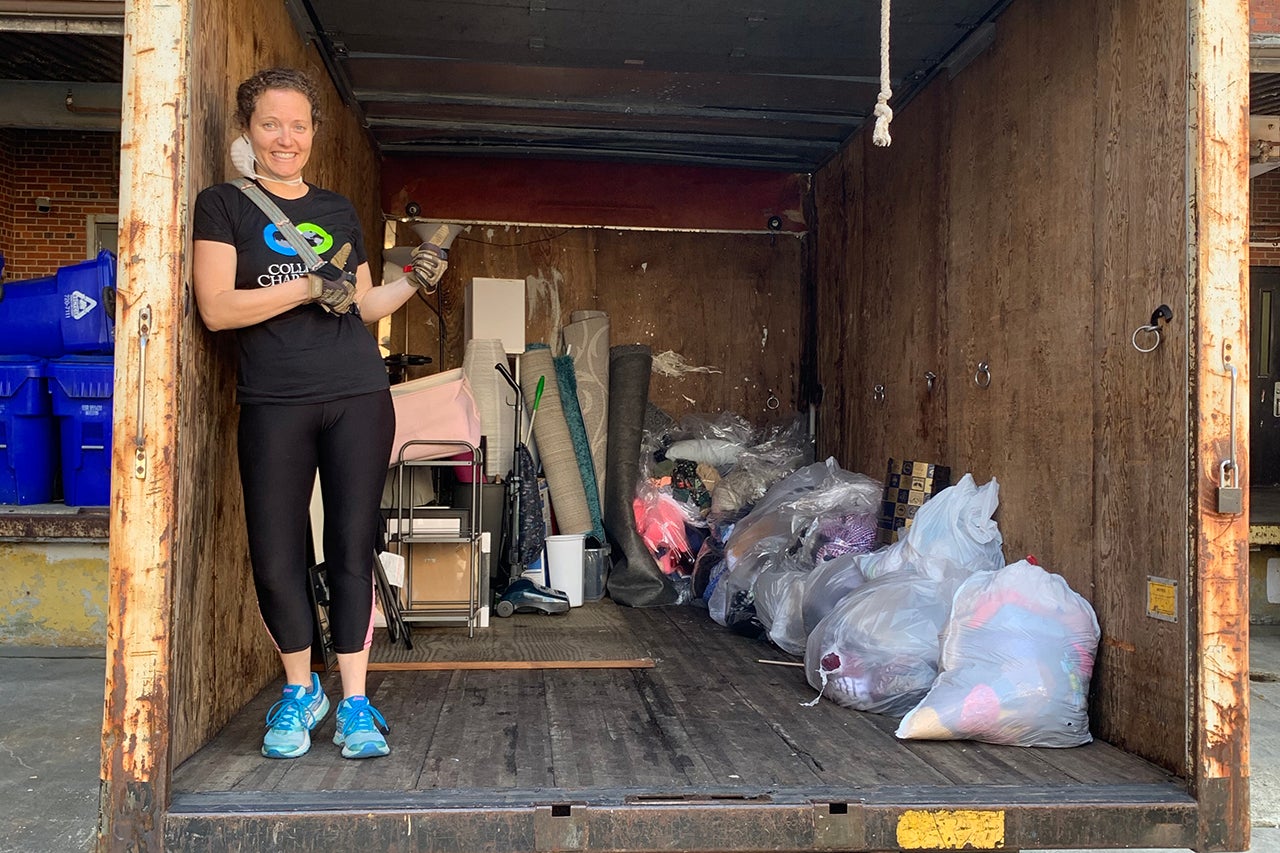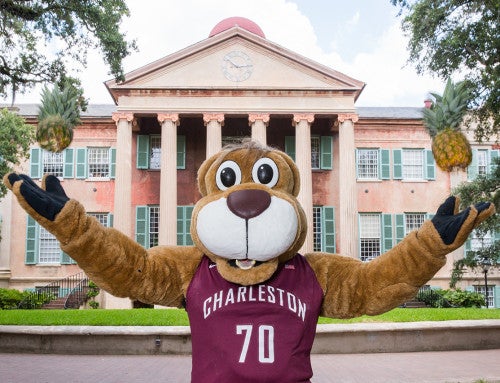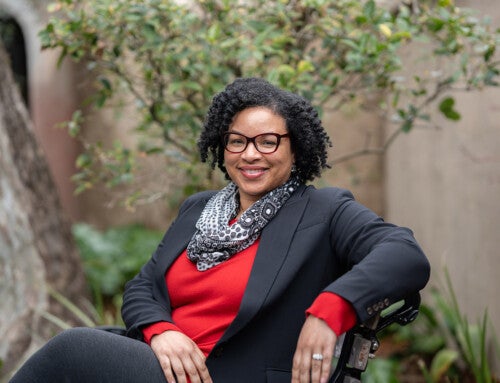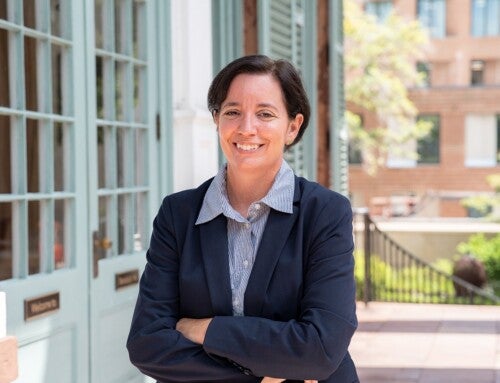As we look forward to a new year, we’re all ready for a fresh start – out with the old, in with the new! And, whether that means clearing out an office desk drawer or creating space for new commitments, the College’s Center for Sustainable Development (CSD) encourages faculty and staff to keep their cleaning … well, clean.
That’s because – with a goal of diverting 90 percent of the College’s waste from the landfill by 2025 – the CSD needs the support of every department, every office and every individual employee.
“We welcome everyone’s participation in these efforts, as it will truly take the entire campus community to help us reach our goal of zero waste,” says Darcy Everett, sustainability director and coordinator of the College’s zero-waste initiative, who also actively supports the College’s participation in the Green Office Certification Program, providing faculty, staff and students the resources to integrate social inclusion and environmental consciousness within working spaces.
Cleaning up your act through the Green Office Certification Program is a great collective New Year’s resolution that can keep individual team members accountable and motivated. Based on six areas of evaluation – waste, energy, water, human health and environmental quality, involvement and accessibility – the program assesses College of Charleston offices using an office checklist of action items, a self-assessment survey taken by participants in the office and a waste audit that looks at the office’s use of and policies regarding, among other things, the following:
- dish ware and food – Are zero-waste events requested when available? Have orders for plastic water bottles and Styrofoam cups stopped?
- paper and office supplies – Is double-sided printing set as default on computers? Is it policy to check Central Stores before purchasing new furniture/equipment?
- recycling – Are recycling bins available and clearly labeled? Are specialty recycling bins available in a common area?
Offices can achieve a bronze, silver or gold ranking and have the opportunity to improve their Green Office status – and three offices have already done so: The Department of Hispanic Studies has achieved bronze status and the Office of the Registrar and the Transfer Resource Center are both gold. Regardless of the level of certification, by joining the Green Office Certification Program, offices build productive workspaces and mindsets and work toward conserving energy, resources and money.
A clean start, of course, doesn’t always mean making collective commitment – sometimes it means just means making a “Toss” pile.
Here are some must-know tips for de-cluttering, recycling and reusing on campus:
Know what can be recycled – and what can’t be.
“Think before you throw, and please don’t be a wishful recycler,” says Everett. “Don’t throw an item in the bin because you hope it can be recycled. If you’re unsure whether something is recyclable, it’s best to just to discard it in a waste bin so that it goes to the landfill.
 “Remember that compostable does not mean recyclable,” she continues, noting that – with the dining halls’ uptick in to-go meals due to COVID-19 – there has been a corresponding uptick in recycling contamination. “Unfortunately, these compostable containers are not recyclable.”
“Remember that compostable does not mean recyclable,” she continues, noting that – with the dining halls’ uptick in to-go meals due to COVID-19 – there has been a corresponding uptick in recycling contamination. “Unfortunately, these compostable containers are not recyclable.”
Those food containers should be discarded into the compost bins outside Starbucks and City Bistro and inside Marty’s Place and Liberty Street Fresh Foods.
Also, Everett says: “Don’t recycle plastics that are not bottles or containers, including things like hangers or plastic bags. While plastic bags can be returned to your local grocery store for recycling, they cannot be recycled in the bins on campus.”
Finally, disposable masks and gloves do not go in the recycling bins – instead, they should dispose of these in the landfill bins.
When in doubt, refer to this recycling guide specifying what you can recycle on campus or contact the CSD at [email protected].
Make sure your recyclable materials are clean and food-free.
“So much has changed since 2017 when the Chinese government established strict rules regarding the importation of solid waste – including the millions of pounds of plastic and paper that was sent there by the U.S. annually,” says Everett. “One consequence of these new restrictions for our campus is ensuring that our recyclables are clean and contamination free.”
Separate your recyclables according to the CSD’s new signage.
 “Co-mingling plastic and paper,” says Everett, “can cause real problems for the recovery facilities where we send our materials. We send all of the containers (cans and bottles) and separated cardboard collected on campus to Charleston County’s material recovery facility. Our mixed paper goes to Sonoco in North Charleston to be recycled. This is the reason we have two separate bins in most locations on campus. And it’s the reason why we worked diligently over the summer to update the signage on those bins and all the recycling areas across campus.”
“Co-mingling plastic and paper,” says Everett, “can cause real problems for the recovery facilities where we send our materials. We send all of the containers (cans and bottles) and separated cardboard collected on campus to Charleston County’s material recovery facility. Our mixed paper goes to Sonoco in North Charleston to be recycled. This is the reason we have two separate bins in most locations on campus. And it’s the reason why we worked diligently over the summer to update the signage on those bins and all the recycling areas across campus.”
To request updated recycling signage for your building or office suite, please contact [email protected]. If you’re experiencing recycling overflows, call 3.5550.
Find the right place for the right recyclable.
“Make sure you also know about our specialty recycling bins, the TerraCycle bins at 14 Green Way and the textile recycling bin behind Addlestone Library,” says Everett, noting that faculty and staff may visit the CSD’s interactive recycling map to find different kinds of locations. “These are all great resources to use for reducing the waste generated on campus.”
Specialty Recycling – Items like ink/printer cartridges, batteries and small electronics (e.g., cellphones) may be recycled at the Specialty Recycling bins on the fifth floor of the BellSouth Building, the second floor of the Rita Liddy Hollings Science Center, and the first floors of the J.C. Long Building, the School of Sciences and Mathematics Building, the Lightsey Center, the Stern Student Center and the Education Center.
TerraCycle – Office supplies like mechanical pencils and pens/markers/highlighters and their caps, as well as personal care and beauty products and natural care products – maybe be recycled at one of the TerraCycle drop-off stations at 14 Green Way. Please note: Paint brushes, colored pencils and wooden pencils are not accepted.
Think outside the recycling bin.

CofC faculty and Samuel Jenkins (the College’s inventory manager) hauled a full SUV-load of specialty recycling to Central Stores.
“On a larger scale, I encourage everyone to think more about refusing, rethinking, reducing and reusing before resorting to recycling,” says Everett. “There are a lot of neat resources here in Charleston – like the Buy Nothing Project, the Charleston Library of Things and even our own Free Store on campus – that can help you reduce and reuse before buying new.”
The CSD’s Free Store has more than 300 binders, dividers, hanging folders and accordion file folders available to faculty, staff and students. The Free Store is available Mondays, Wednesdays and Fridays from 10 a.m. to 2 p.m. by appointment only.
Shop the virtual Free Store, reserve your items and make an appointment for pickup through this Google document. To submit unwanted gently used office supplies (binders, folders, etc.) to the Free Store for students, faculty and staff who want to save money on supplies, contact the CSD.
And, instead of throwing away clothing or household accessories, donate to one of these nonprofits!
To participate in the Green Office Certification Program, offices should first assign a sustainability ambassador and then complete the interest form, located on the program webpage.





